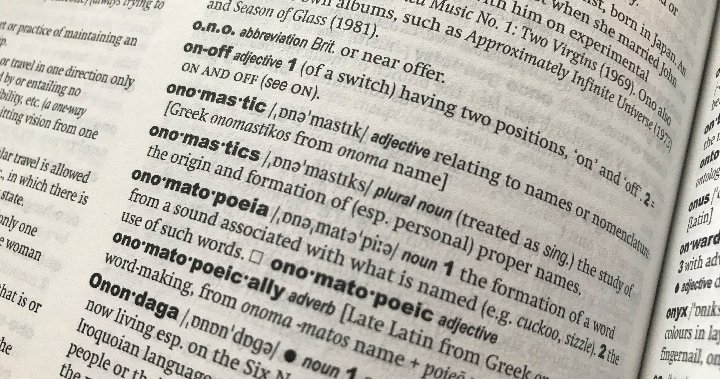The English language has been evolving for centuries. Each year, new words are added while obsolete words fall from common use.
For example, the Oxford English Dictionary, the ultimate arbiter in words with its 20 printed volumes and 21,739 pages, declared at the end of 2020 that adulting — “to become, be, or behave as an adult; (now) esp. to carry out the mundane or everyday tasks that are a necessary part of adult life” — is now officially part of the everyday lexicon.
On the other hand, while it’s still in the OED, when was the last time you used brabble in a sentence? (Brabble: To bicker loudly about trifles or nothing at all.)
As a writer, I love words and the power they have. I’m always looking for ways to expand my vocabulary. For example, I recently came across cockalorum, which describes a person who has an overly high opinion of himself. Then there’s groak, which is to stare silently at someone who is eating, hoping that they will offer you some. If you stare long enough, you might get a tittynope (a small quantity of something left over.) Type that last one out in Microsoft Word, and you’ll get a very angry red line.
Other languages are far more expansive than English. German, for example, has over 5.3 million words, thanks to its ability to just add syllable after syllable to root words. My favourite new German word is Trumpregierungsschlamasselschmerz, which describes the anxiety and fretting brought on by Donald Trump. And the next time you try to drown out your feelings by eating, note that you’re bound to see kummerspeck (literally “grief bacon”), which is the weight you will inevitably gain.
At the risk of being a pochemuchka (Russian for a person who asks too many questions), English can suffer from esculhambação (Brazilian Portuguese describing a mess because of organizational incompetence) when it comes to words, we need for a couple of musical situations.

A little over a year ago, a woman named Susan wrote me with a problem. “Is there a word for the sense of immense disappointment that occurs when you turn on your radio and catch just the closing bars of one of your favourite songs, which you had been hoping to hear because you love it so much and realized you just missed it?” I couldn’t find such a word in any language. Then again, my German is a little rusty.
Or maybe we just need to make something up ourselves. I did such a thing about 15 years ago while working on one of my Ongoing History of New Music shows that dealt with the origin of band names. What do you call such study?
The study of words is called etymology. If you study the origin of the names, that’s called onomastics. Exploring the origins of place names is toponymy. And if you’re interested in working out the origins of personal names, you’re engaged in anthroponomastics. But the origins of the names of musical groups? There was no such word for that field of mateotechny (an unprofitable science).
This was unconscionable. Many books have been written about how bands got their names. How could this discipline itself be nameless? I decided to consult some real onomasticians.
The first call went to Sheila Embleton, a professor of linguistics at York University. She was on a panel of word-wise colleagues around the planet, including Mark Hershon. His team in Calfornia specialized in coming up with brand names. Got a BlackBerry, use OnStar, or have Febreze in the cupboard? All those terms came from Mark’s people.
After some conference calls, these word boffins returned with their findings. No, there was no such word in the English language — but they had come up with a solution. Academic investigations into the origins of band names (or those names adopted for professional purchases in the field of music) shall be known as bandomynology.
Here are some examples. Where did the name Black Sabbath come from? The members of a group from Birmingham called Earth needed a name change. Across the street was a movie theatre playing the 1963 Boris Karloff movie Black Sabbath. Bingo. Foo Fighters is derived from WWII fighter pilots who were scrambled to defend against mysterious UFOs that appeared as balls of fire — feu in French — and were therefore dubbed Foo Fighters. Green Day is named after a day doing nothing but smoking pot. We’ve just engaged in some bandomynology.
I immediately began using the word on the radio and in print, hoping to establish it as an actual term. It’s now in the Urban Dictionary but alas did not make the last edit of the OED in 2011. And there’s no Wikipedia entry other than its appearance in the article for The Ongoing History of New Music.
It would be a very big help if you started using the word yourself, especially if you’re some kind of writer or academic. And if you’re so inclined to create a Wikipedia entry, I’d be forever grateful (It’s bad form to create a self-service Wiki entry, so I can’t really do it myself.)
There is precedent for this. Sometime in the mid-20th century, the German word ohrwurm morphed into earworm, which is when a song gets stuck in your head, playing over and over again. It started to really catch on after it appeared in a 1978 novel by Desmond Bagley entitled Flyaway, where the author references the word’s German origins.
And there’s mondegreen, which is what happens when you mishear or misinterpret a song lyric. Think “‘Cuse me while I kiss this guy” from Jimi Hendrix’s Purple Haze. Credit American writer Sylvia Wright for coming up with that one in 1954 when as a young girl, she confessed to hearing a Scottish lyric that went “layd him on the green” as “Lady Mondegreen.”
I hope all this didn’t create verschlimmbesserung (German: an attempt at improving things but instead just made everything worse) with all this. I’m really just striving for some lagom (Swedish: making things just right.) If this doesn’t work, well shouganai (Japanese for, er, que sera sera.)
—
Alan Cross is a broadcaster with Q107 and 102.1 the Edge and a commentator for Global News.
Subscribe to Alan’s Ongoing History of New Music Podcast now on Apple Podcast or Google Play
© 2021 Global News, a division of Corus Entertainment Inc.


